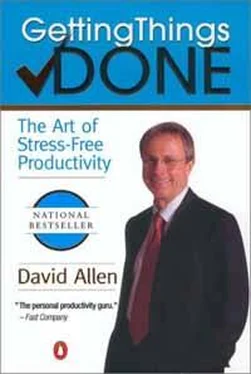Now write down the very next physical action required to move the situation forward. If you had nothing else to do in your life but get closure on this, where would you go right now, and what visible action would you take? Would you pick up a phone and make a call? Go to your computer and write an e-mail? Sit down with pen and paper and brainstorm about it? Talk face-to-face with your spouse, your secretary, your attorney, or your boss? Buy nails at the hardware store? What?
Got the answer to that? Good.
Was there any value for you in these two minutes of thinking? If you're like the vast majority of people who complete that drill during my seminars, you'll be experiencing at least a tiny bit of enhanced control, relaxation, and focus. You'll also be feeling more motivated to actually do something about that situation you've merely been thinking about till now. Imagine that motivation magnified a thousandfold, as a way to live and work.
Think like a man of action, act like a man of thought.'
— Henry Bergson
If anything at all positive happened for you in this little exercise, think about this: What changed? What happened to create that improved condition within your own experience? The situation itself is no further along, at least in the physical world. It's certainly not finished yet. What probably happened is that you acquired a clearer definition of the outcome desired and the next action required.
But what created that? The answer is, thinking. Not a lot, just enough to solidify your commitment and the resources required to fulfill it.
The Real Work of Knowledge Work
Welcome to the real-life experience of "knowledge work," and a profound operational principle: You have to think about your stuff more than you realize but not as much as you're afraid you might. As Peter Drucker has written, "In knowledge work . . . the task is not given; it has to be determined. 'What are the expected results from this work?' is . . . the key question in making knowledge workers productive. And it is a question that demands risky decisions. There is usually no right answer; there are choices instead. And results have to be clearly specified, if productivity is to be achieved."
The ancestor of every action is a thought.
— Ralph Waldo
Most people have a resistance to initiating the burst of energy that it will take to clarify the real meaning, for them, of something they have let into their world, and to decide what they need to do about it. We're never really taught that we have to think about our work before we can do it; much of our daily activity is already defined for us by the undone and unmoved things staring at us when we come to work, or by the family to be fed, the laundry to be done, or the children to be dressed at home. Thinking in a concentrated manner to define desired outcomes is something few people feel they have to do. But in truth, outcome thinking is one of the most effective means available for making wishes reality.
Why Things Are on Your Mind
Most often, the reason something is "on your mind" is that you want it to be different than it currently is, and yet:
• you haven't clarified exactly what the intended outcome is;
• you haven't decided what the very next physical action step is;
and/or
• you haven't put reminders of the outcome and the action required in a system you trust.
That's why it's on your mind. Until those thoughts have been clarified and those decisions made, and the resulting data has been stored in a system that you absolutely know you will think about as often as you need to, your brain can't give up the job. You can fool everyone else, but you can't fool your own mind. It knows whether or not you've come to the conclusions you need to, and whether you've put the resulting outcomes and action reminders in a place that can be trusted to resurface appropriately within your conscious mind. If you haven't done those things, it won't quit working overtime. Even if you've already decided on the next step you'll take to resolve a problem, your mind can't let go until and unless you write yourself a reminder in a place it knows you will, without fail, look. It will keep pressuring you about that untaken next step, usually when you can't do anything about it, which will just add to your stress.
This constant, unproductive preoccupation with all the things we have to do is the single largest consumer of time and energy.
— Kerry
Your Mind Doesn't Have a Mind of Its Own
At least a portion of your mind is really kind of stupid, in an interesting way. If it had any innate intelligence, it would remind you of the things you needed to do only when you could do something about them.
Do you have a flashlight somewhere with dead batteries in it? When does your mind tend to remind you that you need new batteries? When you notice the dead ones! That's not very smart. If your mind had any innate intelligence, it would remind you about those dead batteries only when you passed live ones in a store. And ones of the right size, to boot.
Between the time you woke up today and now, did you think of anything you needed to do that you still haven't done? Have you had that thought more than once? Why? It's a waste of time and energy to keep thinking about something that you make no progress on. And it only adds to your anxieties about what you should be doing and aren't.
It seems that most people let their minds run a lot of the show, especially where the too-much-to-do syndrome is concerned. You've probably given over a lot of your "stuff," a lot of your open loops, to an entity on your inner committee that is incapable of dealing with those things effectively the way they are—your mind.
Rule your mind or it will rule you.
The Transformation of "Stuff"
Here's how I define "stuff": anything you have allowed into your psychological or physical world that doesn't belong where it is, but for which you haven't yet determined the desired outcome and the next action step. The reason most organizing systems haven't worked for most people is that they haven't yet transformed all the "stuff" they're trying to organize. As long as it's still "stuff," it's not controllable. Most of the to-do lists I have seen over the years (when people had them at all) were merely listings of "stuff," not inventories of the resultant real work that needed to be done. They were partial reminders of a lot of things that were unresolved and as yet untranslated into out-comes and actions—that is, the real outlines and details of what the list-makers had to "do."
We need to transform all the "stuff" we're trying to organize into actionable stuff we need to do.
"Stuff" is not inherently a bad thing. Things that command our attention, by their very nature, usually show up as "stuff." But once "stuff" comes into our lives and work, we have an inherent commitment to ourselves to define and clarify its meaning. That's our responsibility as knowledge workers; if "stuff" were already transformed and clear, our value, other than physical labor, would probably not be required.
At the conclusion of one of my seminars, a senior manager of a major biotech firm looked back at the to-do lists she had come in with and said, "Boy, that was an amorphous blob of undo ability!" That's the best description I've ever heard of what passes for organizing lists in most personal systems. The vast majority of people have been trying to get organized by rearranging incomplete lists of unclear things; they haven't yet realized how much and what they need to organize in order to get the real payoff. They need to gather everything that requires thinking about and then do that thinking if their organizational efforts are to be successful.
Читать дальше











